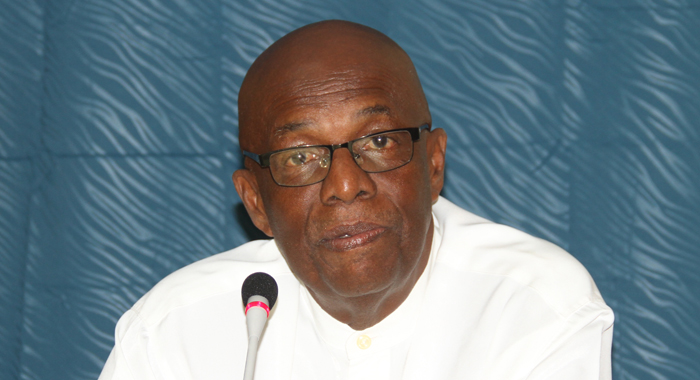Former leader of the opposition Arnhim Eustace, an economist, is advising public sector unions in St. Vincent and the Grenadines to keep their guard up when dealing with the issue of pensions reform.
“I [am] not just talking lightly about this matter,” Eustace, who is Member of Parliament for East Kingstown told audiences at his New Democratic Party’s People’s Budget in Kingstown on Monday.
Eustace told the event that in his Budget speech last year, then minister of finance, Prime Minister Ralph Gonsalves was “lamenting” the speed at which the money the government pays for pension was increasing for the civil service pensions.
Gonsalves said something that might have gone over people’s heads when he announced that government had paid over EC$740 million in civil service pensions, Eustace said.
“So there is an implied loan there. But, of course, they can’t say that because that is what they used to pay the people’s pension. But it is growing so fast now that it grew by 9 or 10 per cent last year. So they want to stop the civil service pension,” Eustace said.
Both the government and public service union seem to agree that there is a need for pension reform in St. Vincent and the Grenadines.
Many public service employees in SVG get both a non-contributory pension and a pension from state-owned National Insurance Services, to which both they and the government make a contribution.
Eustace said that decades ago, then prime minister, Sir James Mitchell and his NDP administration had passed a law stating that persons who joined the civil service from 1983 would only receive an NIS pension.
However, the law was rescinded in response to the pressure that accompanied the political unrest of 2000, which led to the early elections of March 2001 that brought the Unity Labour Party to office.

“They’re now feeling the pressure of making the payment,” Eustace said of the ULP government, adding that he does not know if they can any longer support the current pensions arrangements.
“That is why they have appointed people to do a study — actuaries to do a study — and the actuaries have made certain recommendations.
“I don’t believe they can take away anybody’s pension,” he further said of the government.
“They can stop new people getting pension — people who are just employed but they have to find a way to finance all those people who are getting their pension now…
Eustace said that the actuarial review suggests that any government pension would have to become like an NIS pension, with participants making contributions, similar to the NIS where employees contribute 4.5 per cent of their earnings. He added that he knows that the unions have been examining the issue.
“But I am saying that is going to be a hard battle to get that matter resolved. He (Prime Minister Gonsalves) always says it’s NDP that want to bring austerity measures. He gotta bring them now…. So I’m waiting for the negotiations. That’s for the ULP and them.”
Eustace said pension is a serious matter.
“When people toil all their working life, you ain’t supposed to fiddle with those things. You’re not supposed to fiddle there. But they have shown that they have fiddled with the NIS by taking away 23 million from the NIS somewhere between 2013 and 2013,” he said of money that the government withdrew from employees’ salaries and did not pay into the social security agency.
The government then issued the NIS an EC$15 million treasury note.
“I don’t trust them with any of these things and there is no reason to trust them,” Eustace said of the government.
“The negotiations have to take place between the unions and the government. But, from the comments I am hearing from the unions, they seem to be prepared for that battle…” he said.
In his first Budget Address on Feb. 5, Minister of Finance Camillo Gonsalves outlined his government’s six proposals for pension reform.
Camillo, who became Minister of Finance last October, told Parliament that as early as the 2016 Budget Address, the government had made it clear that the current system for payments of pensions poses significant risk for both the government and public service workers.
“The Government will accordingly pursue the matter of pensions reform with increased vigour in this financial year,” he said.
In a closed-door budget consultation last December, Prime Minister Gonsalves told public sector unions that a class war could break out in SVG over pension reform.
He went on to suggest some extreme measures his government can take, such as hiring public servants on contracts, without state pension benefits if a favourable compromise cannot be reached.
The People’s Budget was the NDP’s response to the EC$993.535 million budget that parliament approved on Feb. 5 in the absence of the opposition, which stayed away in protest.







If truth be told, a relatively have-not country like SVG cannot afford to fund generous differential pension plans for certain categories of civil servants while the rest of the people have to make do with the NIS plan or try their best to sock away something every month to support themselves in old age.
State and private pension plans, especially those based on defined benefits and inflation protection, are in trouble all over the world. In rich countries, there is enough maneuverability to keep pushing this problem down the road or make graduated changes that would take decades to correct.
We simply have much less of that maneuverability. Dr. Gonsalves is quite correct to point out that class warfare may cause chaos unless this problem is soon addressed in a comprehensive fashion.
Our civil service, relatively the largest and best paid on the ECCU, has always been a drag on our economy because of its poor service and low level of productivity.
If radical action is not taken soon, the problems in the public sector — too many employees; sky high salaries; rock bottom performance; bloated pensions — will send us all to the poor home.
Especially when the Gonsalve government keep ransacking the NIS by borrowing from it. The NIS is on a hiding to nothing by this government.
If Government employees want to keep there second pension they should subscribe at least 50% to it.
The problem in the mix is if Gonsalves is involved. Because he witnessed a contract with the teachers and then told the teachers it was the best contract they had ever had, then when part of it was needed to be enforced Gonsalves told the teachers they could not do that because the contract was unconstitutional and therefore unenforceable. He later said he and everyone that signed that contract knew is was unconstitutional and therefore unenforceable when they signed it.
Therefore the very much Honourable Arnhim Eustace is spot on correct, unions you need to watch out and don’t bend down in Ralphs company.
This is the first time I agree with your contribution. Indeed it sounds logical and well thought out. However, you will soon find a way to go back to your old default outlook which is pessimism at the highest level.
The Cumrad micromanages everything..that’s a trait of a dictator..I’ve also observed that he could be divisive when it suits him…that’s one tool he’s used quite successfully since he’s been the ultimate leader..pitting one union delegate against another..you really have to show a united front otherwise he’s gonna use his usual tactics to ensure your efforts fail. The people are starting to understand and foretell the Cumrad’s various styles of divide and rule leadership. Guess that’s why as of late he’s been on the defense.